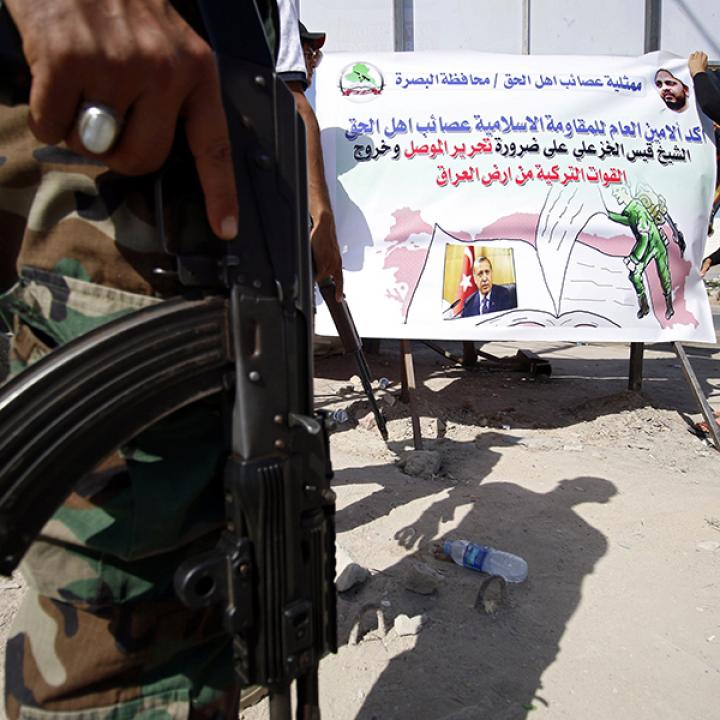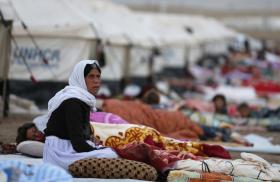
- Policy Analysis
- PolicyWatch 3423
Baghdad Bombing Spurs Major Intelligence and Military Reshuffle

The Iraqi government continues to sharpen the leadership of various commands and bolster civilian control, giving the U.S.-led coalition more leverage to fight the Islamic State with a light footprint.
On January 21, an Islamic State double suicide bombing in Baghdad killed thirty-two Iraqis and wounded over a hundred. In response, the government made immediate changes to its military, police, and intelligence leadership, undertaking one of the most consequential reshuffles in recent history. The changes hold promise for strengthening security across the country, weakening militia-linked parties, and moving Iraq another step toward fuller security sector reform—particularly within the Ministry of the Interior, the government’s largest bureau. The international community should back this progress with behind-the-scenes encouragement and additional offers of assistance, much of it aimed toward Interior Minister Othman al-Ghanimi and his new command staff.
Key Leadership Changes
New command appointments include the following:
- Head of intelligence, Interior Ministry. The Federal Information and Investigations Agency (FIIA), the ministry’s main intelligence arm, is a 9,000-strong organization with offices in fifty-six Iraqi districts and most of the country’s customs points of entry. It also boasts significant cyber and electronic surveillance capabilities. The agency is led by the deputy minister for intelligence affairs. Lt. Gen. Amer Saddam al-Maliki has now been removed from that post and replaced with Lt. Gen. (Ret.) Ahmed Taha Hashim (aka Abu Ragheef), who also heads the Deterring Corruption Committee established on August 27. Previously, Abu Ragheef served as the ministry’s internal affairs investigator in 2004-2005, when officials were first trying to stem the tide of militia penetration.
- Director-general for intelligence and counterterrorism, Interior Ministry; head of the Falcons cell. Veteran official Abdul Karim Abed Fadel Hussein al-Jabari (aka Abu Ali al-Basri) has been removed from his command of the Falcons, a direct-action and intelligence-gathering group that has achieved national fame in Iraq. Contrary to media reports, he has been replaced as of January 26 by Hamid al-Shatri, who will also remain deputy commander of the National Security Service, another intelligence agency. Shatri previously headed the office for coalition-formed Sunni Arab tribal forces in the Popular Mobilization Commission. His first task in his new post will be to integrate the highly independent Falcons back into the broader counterterrorism coordination effort.
- Federal Police commander, Interior Ministry. Fielding around 40,000 combat troops plus support services, the Federal Police is a parallel military service that undertakes counterinsurgency operations alongside the Iraqi Army and the Counter Terrorism Service, as well as urban security efforts in Baghdad and other cities. The organization should be sharpened by this week’s top-down shakeup, starting with the removal of Lt. Gen. Jaafar al-Battat as overall commander. He has been replaced by Maj. Gen. Salih Nasr al-Ameri, who headed the 3rd Federal Police Division in the 2017 battle for Mosul and later led the 2nd Division as well.
- Baghdad Operations Command leadership. The BOC is the overarching security coordination headquarters for inner Baghdad and its rural outskirts. Staff Lt. Gen. Qais al-Muhammadawi has been replaced atop this command by Staff Maj. Gen. Ahmed Salim Bahjat al-Utaibi, a rising star in the new generation of post-2003 general officers and the youngest to qualify for two-star rank (he was forty-two upon his promotion in 2014). The BOC’s intelligence directorate also appears to be under new leadership now that Staff Maj. Gen. Basem Majid has been removed.
The Politics Behind the Reshuffle
In most countries, it is common for military, police, and intelligence chiefs to be reshuffled after security breaches, even if they were not directly responsible for the errors in question. In Iraq’s case, there are many reasons why the current changes are being made, and why the international community should support them:
- Enhancing coordination. The shakeup will facilitate the coordination of numerous intelligence functions that are vital for counterterrorism operations. By drawing together a handpicked team of senior officers, the government will be able to bring key Interior Ministry elements (FIIA, the Falcons, and the Federal Police) and the BOC into much greater alignment with the national command-and-control structure and intelligence-sharing systems. This will improve the functionality of important bodies such as the National Intelligence Coordination Committee, National Intelligence Cell, and National Intelligence Analysis Center, which were formed specifically in response to past bombings of government agencies in Baghdad and can help prevent future terrorist attacks.
- Keeping Baghdad stable. With elections on the horizon as early as this October, and with militias attacking the government and international security partners, maintaining stability in the capital is crucial. Greater intelligence coordination is indispensable to this effort, and reducing militia influence in security organs is important as well. The new handpicked intelligence and urban security leaders have been directed to tighten security in the government center, including through a new U.S. grant of $20 million for modernized perimeter security. They have also been asked to coordinate more closely with Baghdad’s preexisting protective agencies such as the Signals Intelligence Center and the interagency Surveillance Committee. These steps will improve stability in the face of potential hostile actions by the Islamic State, terrorist militias, criminals, and/or violent mobs.
- Maintaining access to international support. The leadership shakeup should help preserve Iraq’s access to Western intelligence support and collection systems, since the new officers fulfill the criteria for such engagement and do not have black marks on their records in terms of human rights abuses, corruption, or close ties to hostile foreign intelligence services. This will ensure the long-term provision of vital technical assistance in the ongoing campaign to defeat the Islamic State insurgency.
Implications for U.S. Policy
In the past, the political leanings and conduct of certain senior officials in Iraq’s Interior Ministry often impeded international security assistance. The situation is starkly different after this week’s reshuffle and previous reforms. Ghanimi, who has served as interior minister for less than a year, is a retired military chief of staff and a lifelong uniformed public servant. The ministry’s new intelligence chief is the same hard-edged disciplinarian (Abu Ragheef) whose committee made Iraq’s first major, credible anti-corruption arrests since 2003—and followed them up with jail sentences for two perpetrators and ongoing cases for seventeen others. The highly valuable Falcons cell is no longer the fiefdom of a single militia-linked spy chief (Abu Ali), but now answers to national command and control.
The United States and other coalition partners should greet these improvements with effusive encouragement and increased support. They should also arrange prompt meetings with the new leaders and quickly progress to new plans and programs aimed at supporting the Interior Ministry, which is often overlooked despite its status as Iraq’s largest security agency.
Perhaps most urgent, the thirteen-nation Military Advisory Group should quietly canvass bodies such as the Baghdad Operations Command, National Intelligence Analysis Center, Baghdad Surveillance Committee, and Signals Intelligence Center to ascertain the near-term requirements for supporting intensified efforts to prevent bombings in Baghdad. With the Islamic State’s rural insurgency at a historic nadir, the terrorist movement has strong incentives to strike the capital, where even small bombings can have an international impact. For their part, Iran-backed militias could exploit mass-casualty attacks in Baghdad to justify their armed presence in urban areas, undermine confidence in the government, and spread misinformation about Gulf or Western involvement in such incidents. For example, their networks quickly blamed the January 21 bombing on Saudi Arabia, then claimed to launch drones against the kingdom as retaliation two days later.
The best way for the Biden administration to keep Iraq off the front pages is to sharpen up Baghdad’s defenses. Fortunately, Washington and its partners can do a great deal along those lines with very little investment of money and no added security risks to their personnel.
Michael Knights, the Bernstein Fellow with The Washington Institute, has profiled Iran-backed militias and politicians in Iraq since 2003.



